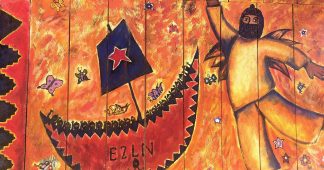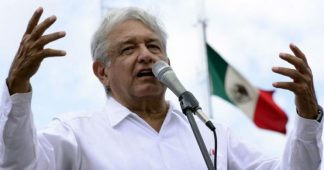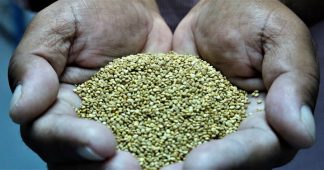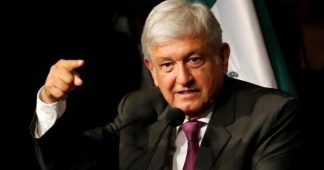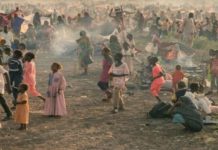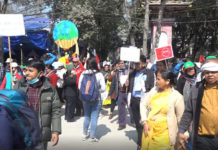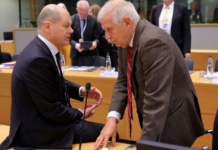sdfasd
David Raby writes: Under President Andrés Manuel López Obrador (AMLO) Mexico is undergoing a radical change, the “Fourth Transformation” (4T) aiming above all to help the poor, excluded and marginalised. The social programmes introduced since he took office 18 months ago are particularly relevant now in the Covid-19 pandemic and the accompanying global economic crisis.
In part these initiatives are simply designed to improve and complete an always limited and inadequate welfare state, and to remedy the damage inflicted by decades of neoliberal cutbacks and privatisations. This in itself is positive and significant in the context of the rise of the extreme right globally and in the Latin American region in particular, but there is more than this to AMLO’s project. What is at stake is not simply the provision of welfare but the empowerment of the popular sectors, by making services and resources available to enable workers and marginalised groups to become active participants in social transformation.
“Sowing Life”
This drive for popular empowerment is clear in one of the first programmes to be launched, Sembrando Vida (“Sowing Life”). Its purpose is to encourage “agro-forestry production” combining traditional staples intercropped with trees suitable for either fruit or timber. Small farmers below the official rural poverty line, owning or possessing at least 2.5 hectares of suitable land, are encouraged to apply.i
If approved, the farmers receive 5,000 pesos (about $220 US) a month with plants, tools and supplies, and technical advice. The technicians are told to work with the peasants on a basis of respect, sharing knowledge and learning from their understanding of nature and local conditions. Sembrando Vida covers 19 of the country’s 32 states, excluding the most urbanised or commercialised areas.
The aim is to improve the welfare and productivity of small and especially indigenous farmers, promoting equality, sustainability and long-term regional development of the poorest and most marginal areas.
By the end of 2019 Sembrando Vida had already created 230,000 jobs and achieved the reforestation of 500,000 hectares, and it was announced that it would be extended to another 200,000 beneficiaries, leading to reforestation of 1,075,000 hectares in total.ii
Although the grants are awarded to individuals, Sembrando Vida naturally encourages cooperation and collective projects as were already customary with Mexico’s traditional ejidos and indigenous communities. It works through Farming Study Communities (Comunidades de Aprendizaje Campesino, CACs) with 25 members and at least 62.5 hectares per community. Its operation is well described in a post on the Welfare Ministry’s blog, “Recovery of identity for restoring our native crops”:iii
With the aim of preventing environmental decay and of contributing to the reduction of rural poverty through restoration of the land and productive inclusion, the Sembrando Vida programme is based on organic agriculture, with special interest in restoring and preserving native crops.
Cultivation centres on community nurseries and the inclusion of trees typical of each locality. GM plants are excluded and traditional or alternative methods of cultivation are promoted. Knowledge exchange is encouraged with dialogue in the CAC Study Committees on a democratic basis. The aim is also to respect the social and economic customs of local people rather than imposing bureaucratically-determined norms.
Support for the Old and the Young
Before AMLO the situation of senior citizens from poor and marginalised sectors in Mexico was dire. Only in 2007 did the Federal Government begin a public pension system to cover those not included in the official public-sector and unionised worker pension schemes, so that more than 20% of the old-age population received nothing at all, relying on family and charity support. The 2007 system was completely inadequate, and although it was gradually improved down to 2015, an official evaluation in 2018 showed that it did not even reach the minimum subsistence level.iv
One of AMLO’s first priorities was therefore the “Pension for the Welfare of Senior Citizens”, officially launched in late February 2019. It covers all of those over 68 years of age (65 in indigenous communities) not covered by other private and public schemes, delivering more than twice the amount of the previous federal pension.v
More than 8 million seniors are now benefiting from it, and as with other benefits introduced by the current government, it is paid directly by bank transfer from the Finance Ministry to each individual, without intermediaries (this is possible because of reforms to the banking system to ensure universal access). Registration is guaranteed by home visits undertaken by Welfare Ministry officials. Moreover in April 2020 it was announced that these pension payments were being brought forward by three months to provide emergency funds for people during the Covid-19 lockdown.vi
Another much-needed scheme recently introduced is incapacity benefit for children and young people under 30 years of age, and for adults over 30 in indigenous communities and in urban areas with a high level of marginality, for a total of over 800,000 beneficiaries.vii
An equally important priority was to provide support for young people from disadvantaged sectors, and to this end the government launched a programme called “Young People Building the Future” (Jóvenes Construyendo el Futuro). It provides grants for those aged 18 to 29 in neither education nor employment, with apprenticeships for up to one year.
Both the applicants and the employing companies or institutions have to register with the Labour Ministry, and as with other benefits provided by AMLO’s government, the grant is paid directly to the beneficiary so it cannot be withheld or discounted by the employer. It is also the young person who chooses the employer and makes the first approach.
As of 1st June 2020, a total of 632,100 apprentices had been hired, and interestingly nearly two-thirds (416,629) of these were women. They work in all kinds of fields, from community health to arts and crafts to aerospace technology. Progress is monitored by Labour Ministry officials, and online training is encouraged during the pandemic emergency.viii
“The School Is Ours”
One of the most far-reaching and original programmes introduced is in education, and is intended to cover the entire pre-school, primary and secondary system, some 170,000 schools altogether. “The School Is Ours” (La Escuela es Nuestra) aims to devolve educational administration and financing to each school, with an elected School Participatory Administration Committee (Comité Escolar de Administración Participativa, CEAP) to administer the budget, maintenance and general management.
The CEAP has a parent as Chair, a parent or member of teaching staff as Secretary, a parent (mother or female guardian) as Treasurer, two more voting members (parents or teaching staff), and one non-voting student from the fourth grade or above.ix The members of the CEAP are elected by a School Assembly consisting of parents and/or guardians, teachers and staff, students from fourth grade upwards and community members, and the CEAP must report back to the Assembly.
The radical democracy of this initiative is remarkable, as is the fact that the treasurer of each CEAP has to be a woman. Of course all schools must still conform to the general guidelines of national education policy, and the organisation of the Assembly and election and functioning of the CEAP are assisted and guided by an Authorised Facilitator who may be a civil servant or other responsible official. The Facilitator must register the composition of the CEAP with the Education Ministry and supervise the school administration and financial accounting.
By the beginning of May 2020 a total of 48,163 schools had elected CEAPs and begun to implement the programme.x As well as being a radical experiment in local educational democracy, it stimulates local enterprise as the CEAP can hire local workers and companies to carry out construction and maintenance and provide supplies: another instance of community empowerment.
Popular education has also benefited since 2019 from the Free Textbook Programme which has distributed millions of books to schools throughout the country, and which has received special recognition by UNESCO. When the Covid-19 emergency began, students were given their textbooks to take home, and an ambitious programme of distance learning was organised using the internet, TV and radio to reach the most remote areas.Existing grants and scholarships for students at all levels are also being increased.
Access to higher education is also being opened up with the creation of “Benito Juárez Welfare Universities” in communities characterised by extreme poverty and marginalisation. The scheme began in March 2019 and by early 2020 there were 101 such university campuses in all states of the Republic, with over 45,000 students and 36,000 teaching staff registered, although not yet fully functioning. They work closely with local communities in these marginalised areas, and offer access to higher education to those who would otherwise be excluded.xi
Reviving the Economy from the Bottom Up
Once the Covid-19 pandemic arrived and the potentially disastrous economic impact of lockdown began to become apparent, AMLO’s government reacted immediately. The opposition predictably claimed that the emergency must mean an end to the 4T Transformation, and advocated classic neoliberal measures such as tax breaks for corporations and further privatisations. The President on the contrary made it clear that the crisis made the Transformation more urgent, not less.
Starting on April 5th 2020 AMLO announced a slew of measures to protect the poorest and most vulnerable and to lay the basis for economic recovery, or at least economic resilience, but with priority for those at the bottom of the economic scale and not at the top.
Existing programmes like “Sowing Life” and “The School Is Ours” were to be increased or accelerated, and new emergency schemes were to be launched to address the situation. The aim, he declared, was to rebuild the economy “from the bottom up”.
A total of 22 million Mexicans would benefit from one social programme or another, amounting with their families to 70% of the population, and the top 30% would also benefit from the recovery of demand. AMLO declared his hope for the country’s future, and as he proclaimed, “Hope…is a very powerful force”.xii
As well as increasing and/or bringing forward payments of pensions for seniors, incapacity benefits and grants and scholarships for students, the government introduced several ambitious new schemes. One of the most important consists of 25,000 peso loans (about $1,100 US) to small business owners, payable over three years with a grace period of three months, at 6% interest (the lowest available inter-bank rate); they are Créditos a la Palabra, on trust (i.e. without collateral). Over 1 million small entrepreneurs will receive them (many already have), and 98% of them run “micro-businesses” with from one to five employees.
A further 600,000 will receive “Solidarity Credits”, also of 25,000 pesos over 3 years at 6% and “on trust”. These are for owners of slightly larger (but still small) businesses which have not dismissed any of their workers despite the crisis, hence the term “Solidarity Credits”. Their data must be registered with IMSS (the Social Security Institute) to confirm eligibility.
A third such microcredit scheme is Tandas para el Bienestar, “Wagers for Welfare”, aimed at those living in the most marginalised areas. If they are 30 to 67 years old and have a small non-agricultural family business which has been operating for at least six months, they can receive a one-year credit of 6,000 pesos on trust and at zero interest. They receive free training and advice, and if they complete repayment punctually they are eligible for a second loan of between 10,000 and 25,000 pesos depending on circumstances. “Wagers for Welfare” began in 2019 on a small scale and is now being greatly expanded, aiming to reach 500,000 people by end 2020.xiii
in the same way mortgage credit is being made available on easy terms through various schemes, with similar principles: rather than the state contracting with large developers and construction companies to build social housing, mortgages are made available direct to workers for them to use as they see fit (subject to regulations on building standards, environment etc).
In other words, each individual, with their family, hires local builders, architects or designers, and tradespeople. There are no intermediaries and minimum bureaucracy, and local enterprise and employment are stimulated.xiv As with “Sowing Life”, as with “The School Is Ours”, as with the credits for small businesses, these housing credits are designed to create hundreds of thousands of Frentes de Trabajo, employment initiatives to stimulate activity by working people throughout the country.
It should be added that all of these schemes, which involve direct bank transfers to millions of individuals, are only possible because of another essential programme, the Banco del Bienestar, a public Welfare Bank which is opening tens of thousands of branches across the country, including in the most remote villages, to guarantee universal access to banking services.
In terms of economic recovery and development there is much more to AMLO’s plans, involving large-scale public works and cooperation with the private sector. But in terms of social welfare and popular empowerment, the schemes analysed here constitute a truly original and creative vision.
David Raby is a writer, political activist and retired academic living in Norwich (UK). Professor Emeritus in Latin American History, University of Toronto, and former Senior Fellow in Latin American Studies, University of Liverpool. Former City Councillor in Norwich. Executive member, Venezuela Solidarity Campaign; Chair, Norwich-El Viejo (Nicaragua) Twinning Link. He can be reached at david.raby@hotmail.com and on Twitter at @DLRaby.
i www.gob.mx/bienestar/acciones-y-programas/programa-sembrando-vida, accessed 27/05/20.
ii www.gob.mx/bienestar/prensa/presentan-avances-del-programa-sembrando-vida, published 21/05/20, accessed 28/05/20.
iii www.gob.mx/bienestar/articulos/reapropiacion-identitaria-para-el-rescate-de-nuestros-cultivos/, published 03/10/19, accessed 28/05/20. Translation mine.
iv dof.gob.mx/nota_detalle.php?codigo=5551445&fecha=28/02/2019, accessed 30/05/20.
v www.gob.mx/bienestar/acciones-y-programas/pension-para-adultos-mayores?state=published, accessed 30/05/20.
vi www.gob.mx/presidencia/es/articulos/version-estenografica-de-la-conferencia-de-prensa-matutina/miercoles-8-de-abril-de-2020, accessed 30/05/20.
vii “AMLO present programa ‘Pensión a personas con discapacidad’, www.youtube.com/watch?v=rxSymaWwyE8, 11/01/19, accessed 04/06/20; and “Presentan avances del programa de pensiones para personas con discapacidad”, www.youtube.com/watch?v=ilDU8aU08A, 03/12/19, accessed 04/06/20.
viii jovenesconstruyendoelfuturo.stps.gob.mx, Secretaría de Gobernación, Diario Oficial, 10/02/2020, accessed 31/05/20.
ix www.sep.gob.mx/dgticDatos/LEEN/escuelas.html, accessed 02/06/20.
x www.gob.mx/presidencia/es/articulos/version-estenografica-de-la-conferencia-de-prensa-matutina/miercoles-6-de-mayo-de-2020, accessed 02/06/20.
xi ubbj.gob.mx/registro, accessed 06/06/20.
xii www.gob.mx/presidencia/es/articulos/version-estenografica-informe-del-presidente-de-la-republica-al-pueblo-de-mexico, 05/04/20, accessed 04/06/20.
